 Raise a Glass to Freedom
Raise a Glass to Freedom
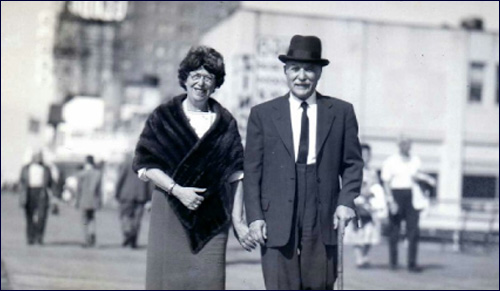

8 min read
There’s a time to uphold the law and there’s a time to outright break it.
My maternal grandfather, JA Samuel, was a successful trader in precious metals, who helped to found the commodities exchange in New York City. Because of his wealth and influence, he was also very involved with trying to save Jewish lives during the Holocaust, including travelling with esteemed rabbis on Shabbos in an effort to raise money for this purpose.
My grandfather’s business, like most, was disrupted by the depression years, and later, the outbreak of World War II. On 9 December 1941, my grandfather unexpectedly received a call from the Japanese Consulate in New York. They wanted to place a huge order for various precious metals that they urgently required, an order which would have brought a very large profit to my grandfather in those difficult financial times.
What made the call rather unusual was its timing. Just two days earlier, on 7 December 1941, “a date that will live in infamy”, in a stunning surprise attack, the Japanese Navy had bombed Pearl Harbor, the United States naval base located in Hawaii, causing massive destruction of both life and property and thrusting the United States into World War II. Over 2 400 Americans were killed and close to 1 200 were wounded as a result of the attack. The very next day, 8 December 1941, the United States declared war on Japan.
In spite of the much needed income, my grandfather told the Japanese Consulate that he was unwilling to do business with them.
In spite of the much needed income, without any hesitation my grandfather told the Japanese Consulate that he was unwilling to do business with them, querying how, after President Franklin D Roosevelt had declared war on Japan, he, a citizen of the United States, could do business with the enemy. The Consulate responded that the US government had given them 30 days to leave, thus making such a deal entirely legal. My grandfather, in turn, responded that, even if this was technically the case, it was almost certainly not what the government had intended by providing such a generous grace period, which was likely only done in order for them to conclude their outstanding business and move things out – not for them to start up new business. Accordingly, he reiterated his position, firmly stating he would not do any business with them, and proceeded to hang up the phone.
I can only imagine the thoughts that went through my grandfather’s mind after he put down the receiver. After all, with the country now at war and only beginning to emerge from the many difficult years of economic depression, money was already very tight and he no doubt thought hard about the many Jewish lives that such a sum could have helped save.
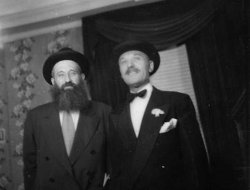 Rabbi Griffel of the Agudas Yisrael with JA Samuel
Rabbi Griffel of the Agudas Yisrael with JA Samuel
And that was the end of it. Or so my grandfather thought. Unbeknownst to him, the US government had started listening to all of the calls going in and out of the Japanese Consulate and had overheard his entire conversation. Imagine his surprise when, only a few hours later, he received a call informing him of this and instructing him to come to the White House for an urgent, private meeting with President Roosevelt, who wanted to thank him personally, as well as formally recognise his exemplary actions.
Although he was an observant Jew, like many religious Jews of that era, my grandfather never wore a yarmulke at work. For his meeting with the president, however, he felt he needed to make an exception, as he wasn’t just representing himself, but every Jew – so he purposely donned his yarmulke for the meeting. In appreciation for my grandfather’s unwavering patriotism, President Roosevelt promised that, henceforth, any platinum which the government might need during the war would be purchased exclusively from him. My grandfather may have lost out on some material reward from the deal he had refused to make with the Japanese, but he more than made up for it with the spiritual reward he reaped from the tremendous Kiddush Hashem (sanctification of God’s name) that he created.
When it came to saving Jewish lives, he didn’t let any laws stand in his way and was even willing to give up his life if necessary.
As much as my grandfather’s patriotism couldn’t be bought, it was eventually trumped by his loyalty to his people. When it came to saving Jewish lives, he didn’t let any laws stand in his way and was even willing to give up his life if necessary. When the danger to the Jews in Europe became clear, he channelled all of his efforts into getting them to America. My grandfather worked hand-in-hand, from a private office in his house, with Rabbi Michoel Ber Weissmandl, z”l, who desperately tried to save Hungarian Jewry, including, at one point, begging the Allies to bomb the train tracks leading to Auschwitz.
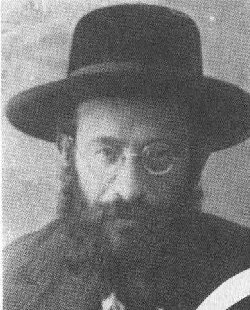 Rabbi Weissmandl
Rabbi Weissmandl
Anyone who wanted to immigrate to America not only needed money and means to get there, but, in order to secure a visa, required a sponsor, who was required to complete an affidavit stating that he accepted financial responsibility for the applicant. My grandfather spent an enormous amount of time and money obtaining the proper documentation for each person he sponsored, and he sponsored hundreds of individuals, including my father’s family. Unfortunately, not every person wanted to, or could, come.
Eventually though, the immigration office decided that, after having completed the forms to sponsor several hundred applicants, my grandfather could not be allowed to sponsor anyone further. Left without any other option, my grandfather made the extremely difficult decision to hire someone to make a forged stamp and letterhead for him. With these tools in hand, he started sending out thousands of forged affidavits to those who needed them, knowing full well that this was an act of treason that could earn him the death penalty.
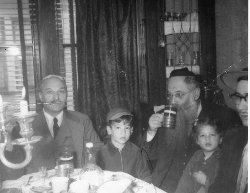 From L to R: JA Samuel, Rabbi Chaim Mordechai (Motel) Katz, the Telzer Rosh HaYeshiva, his son Yankel Velvel Katz, his Daughter Rochel Katz Tress, and the author’s father, Gershon Adler (obscured)
From L to R: JA Samuel, Rabbi Chaim Mordechai (Motel) Katz, the Telzer Rosh HaYeshiva, his son Yankel Velvel Katz, his Daughter Rochel Katz Tress, and the author’s father, Gershon Adler (obscured)
It wasn’t until people actually started trying to enter into the country using these forged documents that the government took note of what was happening and began to investigate. My grandfather was subsequently arrested and put on trial. The day of the trial came and my grandfather braced himself for the worst. As the prosecutor began presenting his case, family legend has it that the judge interjected and said to the prosecutor, “If you had seen today’s papers you would know that that they just reported all of the horrific things that the Nazis have been doing to the Jews in the concentration camps. How can you call what this man did treason? This was an incredibly brave and humanitarian act!” With that, the judge dismissed the trial and my grandfather was released.
Close to a decade later, my grandfather travelled by ship to bury his father in England next to his mother, who had died and been buried there many years earlier. News of his trip made the local papers and, when the ship he was travelling on arrived at the dock, he was quite surprised to be greeted by a crowd numbering in the hundreds. They had all come out to meet him and to thank him for saving their lives. Although they hadn’t made it quite as far as America, the affidavits he had sent to them had made it possible for them to escape from the death sentence they surely faced in Europe.
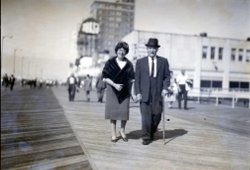 JA Samuel with his wife, Madaline
JA Samuel with his wife, Madaline
Although we knew some of the details of the work that my grandfather had done, the real scope and impact of his actions didn’t really sink in until after he had passed away. From what seemed to be out of nowhere, hundreds upon hundreds of people turned up at the funeral and then at the shiva house to pay their respects to this man who had saved their lives and the lives of their families. Shortly after, my brother discovered among our grandfather’s papers some of the lists of the many names to which he had sent affidavits, both real and forged.
My grandfather taught us by his living example that sometimes circumstances require us to behave in a way that upholds the spirit of the law, even if our actions wouldn’t really be in violation of the letter of the law. But he also taught us that sometimes, circumstances require us to recognise there’s a higher law than the one written by man, and we have to do everything in our power to uphold it. My grandfather knew the difference and was willing to pay the ultimate price if it came to it.
Reprinted from Jewish Life magazine, www.jewishlife.co.za
